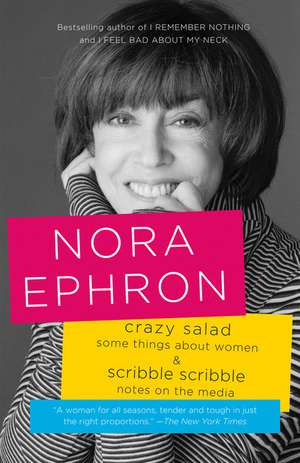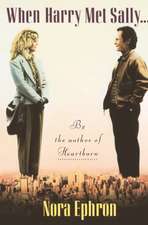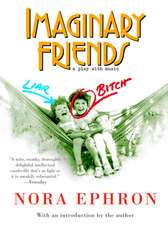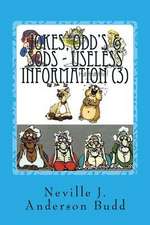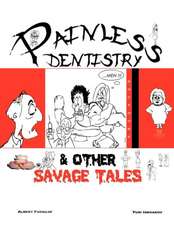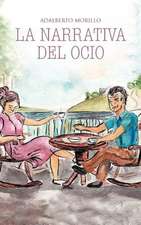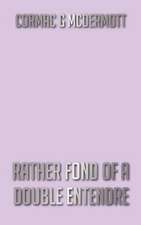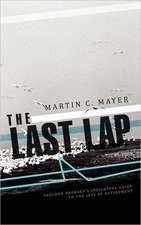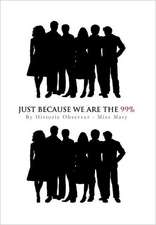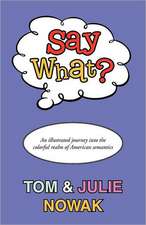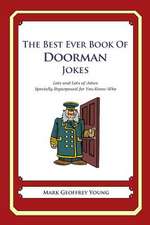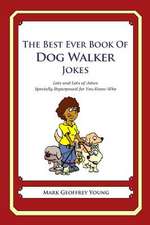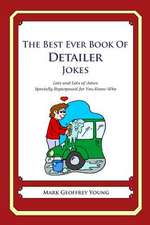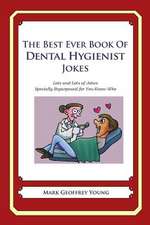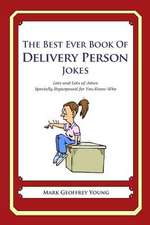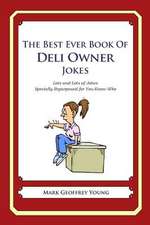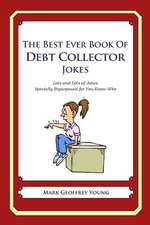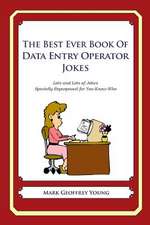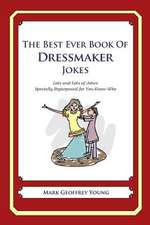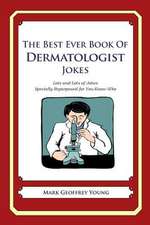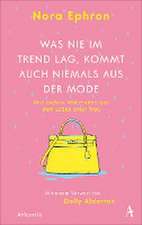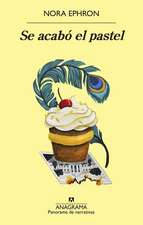Crazy Salad & Scribble Scribble: Some Things about Women & Notes on the Media
Autor Nora Ephronen Limba Engleză Paperback – 15 oct 2012
This edition brings together some of Ephron’s most famous writing on a generation of women (and men) who helped shape the way we live now, and on events ranging from the Watergate scandal to the Pillsbury Bake-Off. In these sharp, hilariously entertaining, and vividly observed pieces, Ephron illuminates an era with wicked honesty and insight. From the famous “A Few Words About Breasts” to important pieces on her time working for the New York Post and Gourmet Magazine, these essays show Ephron at her very best.
Preț: 121.53 lei
Nou
Puncte Express: 182
Preț estimativ în valută:
23.25€ • 24.34$ • 19.24£
23.25€ • 24.34$ • 19.24£
Carte disponibilă
Livrare economică 15-29 martie
Preluare comenzi: 021 569.72.76
Specificații
ISBN-13: 9780345804747
ISBN-10: 0345804740
Pagini: 433
Dimensiuni: 129 x 209 x 23 mm
Greutate: 0.34 kg
Editura: VINTAGE BOOKS
ISBN-10: 0345804740
Pagini: 433
Dimensiuni: 129 x 209 x 23 mm
Greutate: 0.34 kg
Editura: VINTAGE BOOKS
Notă biografică
Nora Ephron was the author of the bestselling I Feel Bad About My Neck as well as Heartburn, Crazy Salad, Wallflower at the Orgy, and Scribble Scribble. She wrote and directed the hit movie Julie & Julia and received Academy Award nominations for Best Original Screenplay for When Harry Met Sally. . ., Silkwood, and Sleepless in Seattle, which she also directed. Her other credits include the script for the stage hit Love, Loss, and What I Wore with Delia Ephron. She died in 2012.
Extras
Excerpted from A Few Words About Breasts
I have to begin with a few words about androgyny. In grammar school, in the fifth and sixth grades, we were all tyrannized by a rigid set of rules that supposedly determined whether we were boys or girls. The episode in Huckleberry Finn where Huck is disguised as a girl and gives himself away by the way he threads a needle and catches a ball—that kind of thing. We learned that the way you sat, crossed your legs, held a cigarette, and looked at your nails—the way you did these things instinctively was absolute proof of your sex. Now obviously most children did not take this literally, but I did. I thought that just one slip, just one incorrect cross of my legs or flick of an imaginary cigarette ash would turn me from whatever I was into the other thing; that would be all it took, really. Even though I was outwardly a girl and had many of the trappings generally associated with girldom— girl’s name, for example, and dresses, my own telephone, an autograph book—I spent the early years of my adolescence absolutely certain that I might at any point gum it up. I did not feel at all like a girl. I was boyish. I was athletic, ambitious, outspoken, competitive, noisy, rambunctious. I had scabs on my knees and my socks slid into my loafers and I could throw a football. I wanted desperately not to be that way, not to be a mixture of both things, but instead just one, a girl, a definite indisputable girl. As soft and as pink as a nursery. And nothing would do that for me, I felt, but breasts.
I was about six months younger than everyone else in my class, and so for about six months after it began, for six months after my friends had begun to develop (that was the word we used, develop), I was not particularly worried. I would sit in the bathtub and look down at my breasts and know that any day now, any second now, they would start growing like everyone else’s. They didn’t. “I want to buy a bra,” I said to my mother one night. “What for?” she said. My mother was really hateful about bras, and by the time my third sister had gotten to the point where she was ready to want one, my mother had worked the whole business into a comedy routine. “Why not use a Band-Aid instead?” she would say. It was a source of great pride to my mother that she had never even had to wear a brassiere until she had her fourth child, and then only because her gynecologist made her. It was incomprehensible to me that anyone could ever be proud of something like that. It was the 1950s, for God’s sake. Jane Russell. Cashmere sweaters. Couldn’t my mother see that? “I am too old to wear an undershirt.” Screaming. Weeping. Shouting. “Then don’t wear an undershirt,” said my mother. “But I want to buy a bra.” “What for?”
I suppose that for most girls, breasts, brassieres, that entire thing, has more trauma, more to do with the coming of adolescence, with becoming a woman, than anything else. Certainly more than getting your period, although that, too, was traumatic, symbolic. But you could see breasts; they were there; they were visible. Whereas a girl could claim to have her period for months before she actually got it and nobody would ever know the difference. Which is exactly what I did. All you had to do was make a great fuss over having enough nickels for the Kotex machine and walk around clutching your stomach and moaning for three to five days a month about The Curse and you could convince anybody. There is a school of thought somewhere in the women’s lib / women’s mag / gynecology establishment that claims that menstrual cramps are purely psychological, and I lean toward it. Not that I didn’t have them finally. Agonizing cramps, heating-pad cramps, go-down-to-the-school-nurse-and-lie-on-the-cot cramps. But, unlike any pain I had ever suffered, I adored the pain of cramps, welcomed it, wallowed in it, bragged about it. “I can’t go. I have cramps.” “I can’t do that. I have cramps.” And most of all, gigglingly, blushingly: “I can’t swim. I have cramps.” Nobody ever used the hard-core word. Menstruation. God, what an awful word. Never that. “I have cramps.”
The morning I first got my period, I went into my mother’s bedroom to tell her. And my mother, my utterly-hateful-about-bras mother, burst into tears. It was really a lovely moment, and I remember it so clearly not just because it was one of the two times I ever saw my mother cry on my account (the other was when I was caught being a six-year-old kleptomaniac), but also because the incident did not mean to me what it meant to her. Her little girl, her firstborn, had finally become a woman. That was what she was crying about. My reaction to the event, however, was that I might well be a woman in some scientific, textbook sense (and could at least stop faking every month and stop wasting all those nickels). But in another sense—in a visible sense—I was as androgynous and as liable to tip over into boyhood as ever.
I started with a 28 AA bra. I don’t think they made them any smaller in those days, although I gather that now you can buy bras for five-year-olds that don’t have any cups whatsoever in them; trainer bras they are called. My first brassiere came from Robinson’s Department Store in Beverly Hills. I went there alone, shaking, positive they would look me over and smile and tell me to come back next year. An actual fitter took me into the dressing room and stood over me while I took off my blouse and tried the first one on. The little puffs stood out on my chest. “Lean over,” said the fitter. (To this day, I am not sure what fitters in bra departments do except to tell you to lean over.) I leaned over, with the fleeting hope that my breasts would miraculously fall out of my body and into the puffs. Nothing.
“Don’t worry about it,” said my friend Libby some months later, when things had not improved. “You’ll get them after you’re married.”
“What are you talking about?” I said.
“When you get married,” Libby explained, “your husband will touch your breasts and rub them and kiss them and they’ll grow.”
That was the killer. Necking I could deal with. Intercourse I could deal with. But it had never crossed my mind that a man was going to touch my breasts, that breasts had something to do with all that, petting, my God, they never mentioned petting in my little sex manual about the fertilization of the ovum. I became dizzy. For I knew instantly—as naïve as I had been only a moment before—that only part of what she was saying was true: the touching, rubbing, kissing part, not the growing part. And I knew that no one would ever want to marry me. I had no breasts. I would never have breasts.
My best friend in school was Diana Raskob. She lived a block from me in a house full of wonders. English muffins, for instance. The Raskobs were the first people in Beverly Hills to have English muffins for breakfast. They also had an apricot tree in the back, and a badminton court, and a subscription to Seventeen magazine, and hundreds of games, like Sorry and Parcheesi and Treasure Hunt and Anagrams. Diana and I spent three or four afternoons a week in their den reading and playing and eating. Diana’s mother’s kitchen was full of the most colossal assortment of junk food I have ever been exposed to. My house was full of apples and peaches and milk and homemade chocolate-chip cookies—which were nice, and good for you, but-not-right-before-dinner-or-you’ll-spoil-your-appetite. Diana’s house had nothing in it that was good for you, and what’s more, you could stuff it in right up until dinner and nobody cared. Bar-B-Q potato chips (they were the first in them, too), giant bottles of ginger ale, fresh popcorn with melted butter, hot fudge sauce on Baskin-Robbins jamoca ice cream, powdered-sugar doughnuts from Van de Kamp’s. Diana and I had been best friends since we were seven; we were about equally popular in school (which is to say, not particularly), we had about the same success with boys (extremely intermittent), and we looked much the same. Dark. Tall. Gangly.
It is September, just before school begins. I am eleven years old, about to enter the seventh grade, and Diana and I have not seen each other all summer. I have been to camp and she has been somewhere like Banff with her parents. We are meeting, as we often do, on the street midway between our two houses, and we will walk back to Diana’s and eat junk and talk about what has happened to each of us that summer. I am walking down Walden Drive in my jeans and my father’s shirt hanging out and my old red loafers with the socks falling into them and coming toward me is... I take a deep breath... a young woman. Diana. Her hair is curled and she has a waist and hips and a bust and she is wearing a straight skirt, an article of clothing I have been repeatedly told I will be unable to wear until I have the hips to hold it up. My jaw drops, and suddenly I am crying, crying hysterically, can’t catch my breath sobbing. My best friend has betrayed me. She has gone ahead without me and done it. She has shaped up.
Here are some things I did to help:
Bought a Mark Eden Bust Developer.
Slept on my back for four years.
Splashed cold water on them every night because some French actress said in Life magazine that that was what she did for her perfect bustline.
Ultimately, I resigned myself to a bad toss and began to wear padded bras. I think about them now, think about all those years in high school I went around in them, my three padded bras, every single one of them with different-sized breasts. Each time I changed bras I changed sizes: one week nice perky but not too obtrusive breasts, the next medium-sized slightly pointy ones, the next week knockers, true knockers; all the time, whatever size I was, carrying around this rubberized appendage on my chest that occasionally crashed into a wall and was poked inward and had to be poked outward—I think about all that and wonder how anyone kept a straight face through it. My parents, who normally had no restraints about needling me—why did they say nothing as they watched my chest go up and down? My friends, who would periodically inspect my breasts for signs of growth and reassure me—why didn’t they at least counsel consistency?
And the bathing suits. I die when I think about the bathing suits. That was the era when you could lay an uninhabited bathing suit on the beach and someone would make a pass at it. I would put one on, an absurd swimsuit with its enormous bust built into it, the bones from the suit stabbing me in the rib cage and leaving little red welts on my body, and there I would be, my chest plunging straight downward absolutely vertically from my collarbone to the top of my suit and then suddenly, wham, out came all that padding and material and wiring absolutely horizontally.
I have to begin with a few words about androgyny. In grammar school, in the fifth and sixth grades, we were all tyrannized by a rigid set of rules that supposedly determined whether we were boys or girls. The episode in Huckleberry Finn where Huck is disguised as a girl and gives himself away by the way he threads a needle and catches a ball—that kind of thing. We learned that the way you sat, crossed your legs, held a cigarette, and looked at your nails—the way you did these things instinctively was absolute proof of your sex. Now obviously most children did not take this literally, but I did. I thought that just one slip, just one incorrect cross of my legs or flick of an imaginary cigarette ash would turn me from whatever I was into the other thing; that would be all it took, really. Even though I was outwardly a girl and had many of the trappings generally associated with girldom— girl’s name, for example, and dresses, my own telephone, an autograph book—I spent the early years of my adolescence absolutely certain that I might at any point gum it up. I did not feel at all like a girl. I was boyish. I was athletic, ambitious, outspoken, competitive, noisy, rambunctious. I had scabs on my knees and my socks slid into my loafers and I could throw a football. I wanted desperately not to be that way, not to be a mixture of both things, but instead just one, a girl, a definite indisputable girl. As soft and as pink as a nursery. And nothing would do that for me, I felt, but breasts.
I was about six months younger than everyone else in my class, and so for about six months after it began, for six months after my friends had begun to develop (that was the word we used, develop), I was not particularly worried. I would sit in the bathtub and look down at my breasts and know that any day now, any second now, they would start growing like everyone else’s. They didn’t. “I want to buy a bra,” I said to my mother one night. “What for?” she said. My mother was really hateful about bras, and by the time my third sister had gotten to the point where she was ready to want one, my mother had worked the whole business into a comedy routine. “Why not use a Band-Aid instead?” she would say. It was a source of great pride to my mother that she had never even had to wear a brassiere until she had her fourth child, and then only because her gynecologist made her. It was incomprehensible to me that anyone could ever be proud of something like that. It was the 1950s, for God’s sake. Jane Russell. Cashmere sweaters. Couldn’t my mother see that? “I am too old to wear an undershirt.” Screaming. Weeping. Shouting. “Then don’t wear an undershirt,” said my mother. “But I want to buy a bra.” “What for?”
I suppose that for most girls, breasts, brassieres, that entire thing, has more trauma, more to do with the coming of adolescence, with becoming a woman, than anything else. Certainly more than getting your period, although that, too, was traumatic, symbolic. But you could see breasts; they were there; they were visible. Whereas a girl could claim to have her period for months before she actually got it and nobody would ever know the difference. Which is exactly what I did. All you had to do was make a great fuss over having enough nickels for the Kotex machine and walk around clutching your stomach and moaning for three to five days a month about The Curse and you could convince anybody. There is a school of thought somewhere in the women’s lib / women’s mag / gynecology establishment that claims that menstrual cramps are purely psychological, and I lean toward it. Not that I didn’t have them finally. Agonizing cramps, heating-pad cramps, go-down-to-the-school-nurse-and-lie-on-the-cot cramps. But, unlike any pain I had ever suffered, I adored the pain of cramps, welcomed it, wallowed in it, bragged about it. “I can’t go. I have cramps.” “I can’t do that. I have cramps.” And most of all, gigglingly, blushingly: “I can’t swim. I have cramps.” Nobody ever used the hard-core word. Menstruation. God, what an awful word. Never that. “I have cramps.”
The morning I first got my period, I went into my mother’s bedroom to tell her. And my mother, my utterly-hateful-about-bras mother, burst into tears. It was really a lovely moment, and I remember it so clearly not just because it was one of the two times I ever saw my mother cry on my account (the other was when I was caught being a six-year-old kleptomaniac), but also because the incident did not mean to me what it meant to her. Her little girl, her firstborn, had finally become a woman. That was what she was crying about. My reaction to the event, however, was that I might well be a woman in some scientific, textbook sense (and could at least stop faking every month and stop wasting all those nickels). But in another sense—in a visible sense—I was as androgynous and as liable to tip over into boyhood as ever.
I started with a 28 AA bra. I don’t think they made them any smaller in those days, although I gather that now you can buy bras for five-year-olds that don’t have any cups whatsoever in them; trainer bras they are called. My first brassiere came from Robinson’s Department Store in Beverly Hills. I went there alone, shaking, positive they would look me over and smile and tell me to come back next year. An actual fitter took me into the dressing room and stood over me while I took off my blouse and tried the first one on. The little puffs stood out on my chest. “Lean over,” said the fitter. (To this day, I am not sure what fitters in bra departments do except to tell you to lean over.) I leaned over, with the fleeting hope that my breasts would miraculously fall out of my body and into the puffs. Nothing.
“Don’t worry about it,” said my friend Libby some months later, when things had not improved. “You’ll get them after you’re married.”
“What are you talking about?” I said.
“When you get married,” Libby explained, “your husband will touch your breasts and rub them and kiss them and they’ll grow.”
That was the killer. Necking I could deal with. Intercourse I could deal with. But it had never crossed my mind that a man was going to touch my breasts, that breasts had something to do with all that, petting, my God, they never mentioned petting in my little sex manual about the fertilization of the ovum. I became dizzy. For I knew instantly—as naïve as I had been only a moment before—that only part of what she was saying was true: the touching, rubbing, kissing part, not the growing part. And I knew that no one would ever want to marry me. I had no breasts. I would never have breasts.
My best friend in school was Diana Raskob. She lived a block from me in a house full of wonders. English muffins, for instance. The Raskobs were the first people in Beverly Hills to have English muffins for breakfast. They also had an apricot tree in the back, and a badminton court, and a subscription to Seventeen magazine, and hundreds of games, like Sorry and Parcheesi and Treasure Hunt and Anagrams. Diana and I spent three or four afternoons a week in their den reading and playing and eating. Diana’s mother’s kitchen was full of the most colossal assortment of junk food I have ever been exposed to. My house was full of apples and peaches and milk and homemade chocolate-chip cookies—which were nice, and good for you, but-not-right-before-dinner-or-you’ll-spoil-your-appetite. Diana’s house had nothing in it that was good for you, and what’s more, you could stuff it in right up until dinner and nobody cared. Bar-B-Q potato chips (they were the first in them, too), giant bottles of ginger ale, fresh popcorn with melted butter, hot fudge sauce on Baskin-Robbins jamoca ice cream, powdered-sugar doughnuts from Van de Kamp’s. Diana and I had been best friends since we were seven; we were about equally popular in school (which is to say, not particularly), we had about the same success with boys (extremely intermittent), and we looked much the same. Dark. Tall. Gangly.
It is September, just before school begins. I am eleven years old, about to enter the seventh grade, and Diana and I have not seen each other all summer. I have been to camp and she has been somewhere like Banff with her parents. We are meeting, as we often do, on the street midway between our two houses, and we will walk back to Diana’s and eat junk and talk about what has happened to each of us that summer. I am walking down Walden Drive in my jeans and my father’s shirt hanging out and my old red loafers with the socks falling into them and coming toward me is... I take a deep breath... a young woman. Diana. Her hair is curled and she has a waist and hips and a bust and she is wearing a straight skirt, an article of clothing I have been repeatedly told I will be unable to wear until I have the hips to hold it up. My jaw drops, and suddenly I am crying, crying hysterically, can’t catch my breath sobbing. My best friend has betrayed me. She has gone ahead without me and done it. She has shaped up.
Here are some things I did to help:
Bought a Mark Eden Bust Developer.
Slept on my back for four years.
Splashed cold water on them every night because some French actress said in Life magazine that that was what she did for her perfect bustline.
Ultimately, I resigned myself to a bad toss and began to wear padded bras. I think about them now, think about all those years in high school I went around in them, my three padded bras, every single one of them with different-sized breasts. Each time I changed bras I changed sizes: one week nice perky but not too obtrusive breasts, the next medium-sized slightly pointy ones, the next week knockers, true knockers; all the time, whatever size I was, carrying around this rubberized appendage on my chest that occasionally crashed into a wall and was poked inward and had to be poked outward—I think about all that and wonder how anyone kept a straight face through it. My parents, who normally had no restraints about needling me—why did they say nothing as they watched my chest go up and down? My friends, who would periodically inspect my breasts for signs of growth and reassure me—why didn’t they at least counsel consistency?
And the bathing suits. I die when I think about the bathing suits. That was the era when you could lay an uninhabited bathing suit on the beach and someone would make a pass at it. I would put one on, an absurd swimsuit with its enormous bust built into it, the bones from the suit stabbing me in the rib cage and leaving little red welts on my body, and there I would be, my chest plunging straight downward absolutely vertically from my collarbone to the top of my suit and then suddenly, wham, out came all that padding and material and wiring absolutely horizontally.
Recenzii
“A woman for all seasons, tender and tough in just the right proportions.” —The New York Times
“A tremendously talented woman from a significant American period. . . . tremendous talent is her forte, her strong suit, her fiendish trump card.” —The Washington Post
“Truly funny and wonderfully wise.” —Chicago Tribune
“Witty whiplash prose—a delight to read.” —Publishers Weekly
“Nora Ephron can write about anything better than anybody else can write about anything.” —The New York Times
“Stylish, opinionated, with a kind of take-no-prisoners fearlessness rooted in both the women’s movement and the equally complex terrain of her own emotions” —Los Angeles Times
“As tart and refreshing as the first gin and tonic of summer.” —The New York Times Book Review
“A brilliant, restless mind.” —Ms.
“Funny, shrewd, devastating.” —Newsweek
“Nora Ephron is, in essence, one of the original bloggers—and if everyone could write like her, what a lovely place the Internet would be. . . . telling stories that were, more often than not, ultimately about herself, and doing so with such warmth, wit and skill that they became universal.” —The Seattle Times
“Always funny.” —Mademoiselle
“Pure delight.” —Playboy
“A tremendously talented woman from a significant American period. . . . tremendous talent is her forte, her strong suit, her fiendish trump card.” —The Washington Post
“Truly funny and wonderfully wise.” —Chicago Tribune
“Witty whiplash prose—a delight to read.” —Publishers Weekly
“Nora Ephron can write about anything better than anybody else can write about anything.” —The New York Times
“Stylish, opinionated, with a kind of take-no-prisoners fearlessness rooted in both the women’s movement and the equally complex terrain of her own emotions” —Los Angeles Times
“As tart and refreshing as the first gin and tonic of summer.” —The New York Times Book Review
“A brilliant, restless mind.” —Ms.
“Funny, shrewd, devastating.” —Newsweek
“Nora Ephron is, in essence, one of the original bloggers—and if everyone could write like her, what a lovely place the Internet would be. . . . telling stories that were, more often than not, ultimately about herself, and doing so with such warmth, wit and skill that they became universal.” —The Seattle Times
“Always funny.” —Mademoiselle
“Pure delight.” —Playboy
